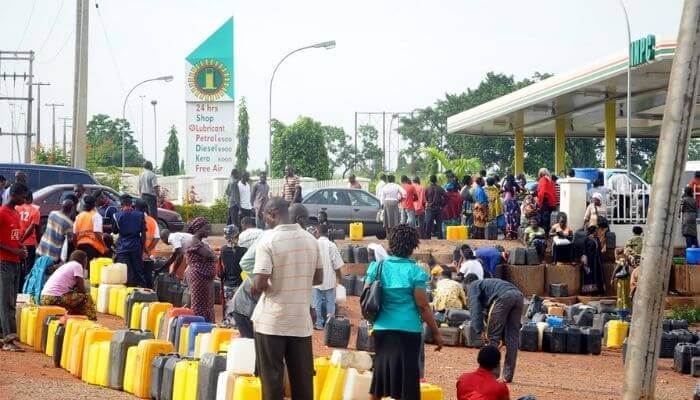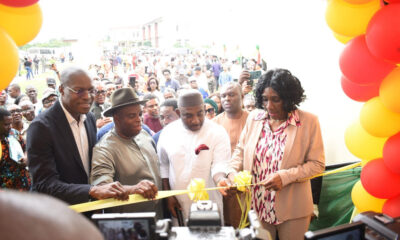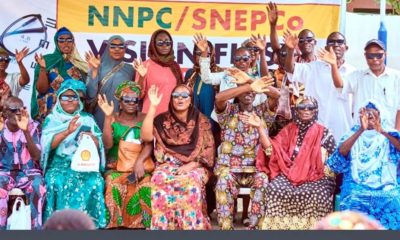Energy
Another Round Of Fuel Crisis Looms, PMS Goes For N900/Litre

The streets of Lagos and Abuja, Nigeria’s economic and political capital cities, respectively, appear to be drifting into another round of energy crisis, with Premium Motor Spirit (PMS), popularly called petrol, selling for N900/litre.
Biztellers reports that this follows the raising of ex-depot price of petrol from N630 to N720/litre by private depot owners.
The immediate response of petrol stations within the Lagos and Ogun States axis has been to declare scarcity, which has triggered panic among the populace.
It was gathered some dealers were reluctant to purchase products at the new rates from the private depots.
The National Vice President of the Independent Petroleum Marketers Association of Nigeria (IPMAN), Hammed Fashola, was cited by The PUNCH as declaring that many filling stations did not open for business because they had no fuel in their tanks.
READ ALSO: Economic Conspiracy: Dangote Accuses IOCs Of Plotting Against Nigerian Refinery
According to Fashola, the Nigerian National Petroleum Company Limited, which is the sole importer of petrol at the moment, should explain to Nigerians what was happening with the product.
In his words, “Those that shut their stations do not have fuel to sell. When you don’t have fuel, you cannot open your station. That is the problem. You know the NNPC is the sole importer of this product. I think it is in the best position to tell us what is actually going on.
“Currently, independent marketers cannot buy what the private depots are selling. They are selling fuel between N715 and N720 per litre. How much will marketers sell the product? Look at the cost of bringing it to their depots; with transportation and other depot expenses, it will be too costly for them. That is why the stations are shut down.
“Some marketers refuse to go and buy because they know the masses cannot afford high-priced petrol in this economy. That is the situation for now.”
Biztellers reports that private depot owners, used to sell petrol to independent marketers at the rate of N630-650/litre, while the NNPC Ltd was selling to major marketers at a price below or around N600.
The pending negotiations between the IPMAN and the NNPC Ltd for direct supplies to its members has not borne fruits.
Biztellers gathered that the NNPC Ltd, instead of seeking a lasting solution was focused on a temporary reprieve by pressuring the private depots in Apapa to prioritise supply to Abuja to dispel mounting fuel queues.
Industry watchers are tracing the short supply to the Lagos and its environs, to the efforts to solve the queues mounting in the Abuja area by shifting supply focus there.
Energy watchers are concerned because the signals appeared too soon after the Reuters averred that Nigeria’s debt to PMS suppliers had surpassed $6bn, doubling the figure as at April. It traced the surge to NNPC Ltd’s failure to bridge the gap between fixed pump prices and international fuel costs.
The Reuters report had asserted that the crisis had long brewed with part of January imports, put between $4bn and $5bn still outstanding to suppliers.
The debt pile-up is being managed, according an unnamed industry source, with “the $250,000 a month (per cargo) for late payment compensation,” the PUNCH wrote.
Even at that, at least two suppliers were said to have stopped participating in recent tenders after hitting self-imposed debt exposure limits to Nigeria, meaning they would not supply more PMS until they receive payments.
As a consequence, Reuters noted, Nigeria’s tenders to buy gasoline in June and July were smaller.
The NNPC Ltd was expected to import via tender about 850,000 tonnes in July, according to the Reuters report quoting sources, down from the typical one million tonnes in previous months.
As that is brewing, some private depot owners have been showing reluctance to supply petrol to independent marketers, who own the larger percentage of the filling stations in Nigeria.
The depot owners on their part, claim they could only distribute what they were supplied by the sole importer, the NNPC Ltd.
One of the depot owners, was cite thus, “Currently, we focus on our filling stations. We get less than 50 per cent of what we usually get from the NNPC now.
So, we make sure we feed our stations first before we consider selling to independent marketers. That is why most of them are out of stock. You know they don’t have access to the NNPC and the little we get is not even enough for our stations,” by The PUNCH.
The IPMAN president had fingered the supply chain, “The current situation is a result of the way private depot owners have been selling their products. It has been very difficult for independent petroleum marketers to get the product and sell it in Abuja and neighbouring states, as well as in other states in the North.
“So the queues you are seeing now are because of the cost of PMS by private depots. The private depots are selling at N710/litre, but if you check the price of the same product at NNPC retail outlets, it is N617/litre.
“Therefore, by the time we independent marketers buy from private depots and bring it to our filling stations, we will not be able to sell our product because our cost price is already so high, while the cost at NNPC retail outlets is far lower.
“And you know that when we buy it at the rate of N710/litre we have to add transportation cost again because there is no equalisation. And when we add the cost of transportation, the pump price is going to be higher than the N710/litre ex-depot price, whereas NNPC stations sell at N617/litre.”
He maintained that the number of stations operated by IPMAN, meant that any distortion in the supply of products to its members would eventually lead to fuel queues because major marketers and NNPC stations are fewer.
Energy
Nigeria’s Gas Output Increases By 2.9%, Reaching 2.29 MSCF

Amid a slight increase in gas production, Nigeria’s oil output experienced a substantial rise in November 2024.
Gas production saw a 2.9% month-on-month (MoM) increase, reaching 2,292,951 million standard cubic feet (MSCF) from 2,292,471 MSCF in October.
However, on a year-on-year (YoY) basis, the growth was minimal, with a mere 0.02% increase in output for the first 11 months of 2024, compared to the same period in 2023.
READ MORE: Tinubu Mourns Ex-U.S. President Jimmy Carter, Celebrates His Legacy
The latest gas report from the Nigerian Upstream Petroleum Regulatory Commission (NUPRC) also revealed a 1.6% increase in domestic gas consumption.
A total of 606,658 MSCF was consumed locally, compared to 596,861 MSCF during the same period in 2023. Gas exports, meanwhile, rose by 6.9%, reaching 829,156 MSCF, up from 775,547 MSCF in the corresponding period of 2023.
This growth in exports continues to play a vital role in bolstering Nigeria’s foreign exchange earnings.
Despite these positive figures, sources close to the Ministry of Petroleum Resources (Gas) noted that oil remains the dominant force in Nigeria’s energy sector, with gas taking a secondary role.
On the other hand, the NUPRC’s oil production report revealed a remarkable surge.
Nigeria’s oil output, including condensates, rose by 13.3% year-on-year in November 2024, reaching 1.7 million barrels per day (bpd), up from 1.5 million bpd in November 2023. Month-on-month, oil production also increased by 10%, from 1.5 million bpd in October 2024.
Dr. Muda Yusuf, CEO of the Centre for the Promotion of Private Enterprises (CPPE), discussed the broader structural dynamics within Nigeria’s economy, highlighting the dominance of the non-oil sector.
In his 2025 Outlook, Dr. Yusuf noted that the non-oil sector contributed 94.43% to Nigeria’s GDP in Q3 2024, while the oil sector accounted for just 5.57%.
“However, the economy is characterized by a paradox of the oil sector contributing an estimated 90% of foreign exchange earnings, while the non-oil sector accounts for about 10%,” Dr. Yusuf said.
“This is a structural shortcoming in our economy which needs to be addressed, as sectors that contribute hugely to GDP have no corresponding contribution to foreign exchange earnings.”
He further emphasized the need to address the challenges faced by the non-oil sector, which include issues related to productivity, infrastructure, funding, and regulatory constraints.
“The policy implication is that more should be done to fix the challenges of productivity and competitiveness of the non-oil sector of the economy,” Dr. Yusuf added
Energy
JUST IN: NNPC Ltd Reopens Warri Refinery

The Nigerian National Petroleum Company Limited (NNPC Ltd) has announced that the 125,000-barrel-per-day Warri Refining & Petrochemicals Company (WRPC) in Warri, Delta State, has become operational.
This is coming about a month after the commencement of operations at the 60,000-barrel-per-day-old Port Harcourt Refinery.
The Group Chief Executive Officer, NNPC Ltd, Mele Kyari, made the disclosure during a tour of the facility on Monday.
ALSO READ: SERAP Urges Tinubu To Direct CCB To Publish President’s, VP’s, Others Assets
A video posted by Channels TV on Monday showed Kyari addressing a tour team, which included the Chief Executive Officer of the Nigerian Midstream and Downstream Petroleum Regulatory Authority (NMDPRA), Farouk Ahmed.
Before the tour commenced, Kyari explained that the inspection aimed to show Nigerians the level of work completed so far.
According to him, although the repairs on the facility are not yet 100 per cent complete, operations have commenced.
He said, “We are taking you through our plant. This plant is running. Although it is not 100 per cent complete, we are still in the process. Many people think these things are not real. They think real things are not possible in this country. We want you to see that this is real.”
Located in Ekpan, Uwvie, and Ubeji, Warri, the petrochemical plant produces 13,000 metric tonnes per annum (MTA) of polypropylene and 18,000 MTA of carbon black.
Commissioned in 1978 and managed by NNPC Ltd, the WRPC was built to supply markets in the southern and southwestern regions of Nigeria.
The mechanical completion of the facility was initially scheduled for the first quarter of 2024, according to the Spokesperson of the NNPC Ltd, Olufemi Soneye.
“Warri should be done by Q1 (first quarter) 2024,” Soneye stated.
The WRPC is one of Nigeria’s four refineries. Others include the old and new Port Harcourt Refining Company in Rivers State and the Kaduna Refining and Petrochemical Company in Kaduna State.
Energy
Dangote Partnership: MRS Urges Nigerians To Insist On N935/Litre Petrol Price Nationwide

MRS Oil Nigeria Plc, a prominent player in the Nigerian downstream oil industry, has implemented a new petrol price of N935 per litre across all its retail service stations nationwide.
The company has also called on Nigerians to monitor and report any outlets that fail to adhere to the new price structure.
Biztellers reports that this is consequent upon an announcement by the President of Dangote Industries Limited, Aliko Dangote, that the Dangote Petroleum Refinery has partnered with MRS Oil and Gas to offer petrol at N935 per litre at retail outlets, following a reduction in the ex-depot price from N970 to N899.50 per litre.
ALSO READ: Dangote Slashes PMS Price To N899.50k
It was gathered that MRS Oil Nigeria Plc has instructed all its outlets to implement the new price immediately, setting up a digital platform and monitoring team to ensure full compliance.
In a statement on Monday night, the company declared, “Petrol is now being sold at N935 at MRS Filling Stations nationwide. If you find any station not following this price, please report it. Call 08009447853 or email: NG-FMKPMGWHISTLEBLOWING@NG.KPMG.COM”
Emphasising the eco-friendly nature of its products, MRS Oil added, “We call on all petrol station owners to join MRS Oil Nigeria Plc in improving the supply chain of our beloved country, ensuring product quality and availability in every corner of Nigeria for the benefit of all Nigerians.”
In Lagos, commuters were seen queuing at MRS filling stations to purchase petrol, with many expressing their gratitude to the Dangote Petroleum Refinery and MRS Oil and Gas, urging other marketers to support the indigenous refinery rather than import off-spec products into the country.
A commuter at the MRS station at Alapere on the Lagos Ibadan Express way, Ibukun Phillips, could not hide her joy as her husband filled up their car.
“I am very happy today. This is a victory for Nigeria,” she said. “The price reduction is the best gift of the season. But beyond just the reduction, we are buying standard, eco-friendly petrol at a lower rate. My husband and I have decided we will only be using MRS from now on because we are confident in the quality of the product and supporting the economy.”
A commercial bus driver, Adio Ajibade described the price reduction as a great relief, especially during the festive season.
“The reduction is a great relief. It will reduce transportation costs and benefit Nigerians. God will continue to bless Alhaji Aliko Dangote,” he said.
A public affairs analyst and university lecturer, Dr. Tunde Akanni, said the collaboration between Dangote Petroleum Refinery and MRS Oil represents a significant step towards improving the affordability, quality, and sustainability of petroleum products in Nigeria.
According to Dr. Akanni, “this move will not only help ease the financial burden on Nigerians but also promote a more environmentally conscious approach to fuel consumption, benefitting both the economy and public health in the long term.”






















